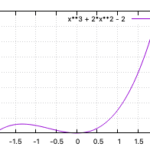string を list() で変換すれば良い。
例
str1 = 'Good morning.' list1 = list(str1) print(list1)
結果
['G', 'o', 'o', 'd', ' ', 'm', 'o', 'r', 'n', 'i', 'n', 'g', '.']
雑記
投稿日:
string を list() で変換すれば良い。
str1 = 'Good morning.' list1 = list(str1) print(list1)
['G', 'o', 'o', 'd', ' ', 'm', 'o', 'r', 'n', 'i', 'n', 'g', '.']
執筆者:seyanen
関連記事

python3 で辞書(dict) の for ループでキーと値を取得する
キーと値を取得するには次のようにする。キーは dict のループ、値は dict の values() のループで取得できる。 例 mydictionary = {‘color’: ‘白’, ‘ani …

2023/01/18
matplotlib のグラフ作成と gnuplot との対応 比較

2022/10/14
pythonで配列(リスト)の、ある要素がわかっているときにその次の要素を取得する方法。